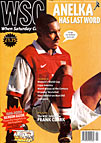 With the attention of off-field matters increasingly turning towards the finances of the game, how long can football clubs survive working on unsustainable budgets?
With the attention of off-field matters increasingly turning towards the finances of the game, how long can football clubs survive working on unsustainable budgets?
It’s an unlikely feat, but the youngster seems to have pulled it off. Even in a summer when words such as “Office of Fair Trading” and “minister for sport” have been grappling for our attention, nothing has hit the high notes on the Yawnometer quite like a mention of Nicolas Anelka.
The off-field issues likely to command attention in the newspapers were once restricted almost exclusively to hooliganism. Now, with the huge sums of money sloshing around at the top level of the game, we are expected to take a keen interest in the intricacies of broadcasting legislation, worldwide marketing initiatives and 20-year-old kids who think they’re worth 56 grand a week.
The outcome of the tedious Anelka saga does not much matter, but the fact that it happened does. In all directions, football’s once familiar boundaries are creaking and groaning at the strains imposed on them by the globalisation of the football market, new television technology, the demands of the stock market and the almost complete freedom of movement of the players.
The consequences are unpredictable, except that the pace of change will continue to increase. Before this decade began, both fans and clubs were considered to be slaves to tradition, unwilling to countenance anything which threatened the traditional order of things, even as the game was demonstrably in decline. Yet throughout the Nineties, the more violent the changes, the more demand for the product called football has surged.
As a result nothing, not even the holders pulling out of the FA Cup, is too wild to contemplate. A World Cup every two years? Why not? Every Premiership game live on one TV channel or another? It’ll happen.Whatever turns a dollar can be justified, and the argument that “the fans won’t stand for it” can never again be put forward with a straight face. They will, it seems, stand for anything.
Yet there has been a manic quality to the close season, a sense that this state of permanent revolution cannot go on much longer. The stock market, of course, is now more than an analogy. Clubs are in there among the men in striped blazers shouting the odds, and the feverish mentality of that unreal world is increasingly being imported into all areas of football.
Nowhere has that frenzied approach been more evident than in the row over players’ wages. Fans, clubs and media seem united in the belief that current wage levels are verging on madness. The discontent stoked by players like Anelka and Jimmy Floyd Hasselbaink is creating an ugly mood throughout the game, where any sense of empathy with footballers (Stan Collymore springs to mind) is dissipated by their extravagant earnings. Even a player occasionally pops up to voice doubts, as Richard Gough did when told he could earn around £1 million for a year at Everton.
“Such is the craziness in terms of payments to players now that I am not sure where it is going to lead,” Gough admitted.
Anyone who has been paying attention to the increasingly strident warnings in the Deloitte & Touche annual reports on football financing can be in little doubt where it is going to lead if things go on as they are. Even based on figures for 1997-98, they estimated that the ratio of wages to turnover was “not sustainable in the longer term” for three Premiership clubs, let alone those lower down. And since then the wages spiral has accelerated further.
No one wants to see clubs go to the wall, but the suspicion is that if a crash does come, football’s traditional bonds of community will have become so threadbare that no one will be in a position to save a large or even medium-sized defaulter. In the Eighties and Nineties, many clubs were rescued partly thanks to the PFA’s willingness to pay the wages for a while. But for all the union’s accummulated resources, it surely cannot be wealthy enough to do so for any length of time now that the bills have risen to such an extent.
Fans, too, may still have a hand in saving smaller clubs in one way or another. Brighton’s return to the town has been one of the few cheering stories of the summer. But no amount of campaigning and fund-raising can save a troubled club of the size of, say, Crystal Palace without the backing of men wealthier (and much cannier) than Mark Goldberg.
The crisis at Palace (one of the three clubs singled out by Deloitte & Touche) is very different from those that afflicted clubs in the Eighties, being the result of sudden and uncontrolled outgoings, rather than declining revenues over a long period. Such troubles, descending more quickly and with more acutely devastating results, are likely to be that much harder to ward off.
Tradition demands that clubs in difficulties are almost always rescued, one way or another. But tradition counts for nothing any more. It’s every person and every club for themselves. Football’s finances, already highly unstable, are entirely unpredictable after 2002, when the current Premier League TV contract expires. As the saying went, the value of football can go down as well as up. And if football’s stock – literally and figuratively – does plummet, an industry that has hitched itself to the values of an unregulated market place has to expect to suffer casualties.
From WSC 151 September 1999. What was happening this month